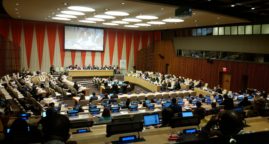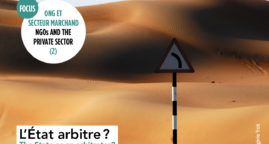Statement by Michel Veuthey | Global Platform for Disaster Risk Reduction (GP2019)
Statement by Professor Michel Veuthey
Deputy Permanent Observer to the U.N. in Geneva
Ambassador to monitor and combat trafficking in persons
Geneva, 17 May 2019 Global Platform for Disaster Risk Reduction (GP2019)
The Sovereign Order of Malta would like to thank the Government of Switzerland for hosting so well the sixth Session of the Global Platform for Disaster Risk Reduction (GP2019) and the UN Office for Disaster Risk Reduction (UNDRR) for their excellent preparatory work.
The Sovereign Order of Malta, founded 900 years ago, is one of the oldest Christian Faith-based humanitarian organizations. It maintains diplomatic relations with 108 countries and with the European Union, and has permanent observer status at the United Nations. It has official relations with other countries and international organizations such as the African Union, the Council of Europe, the Community of Portuguese Language Countries, the Indian Ocean Commission, the International Organization of Francophonie, the Parliamentary Assembly of the Mediterranean, the Interamerican Development Bank, UNIDROIT and UNILAT. It has 120,000 Members, professionals and volunteers active in 120 countries. A lay religious order of the Catholic Church since the 12th century (1113) and a subject of international law, it concluded more than 55 cooperation agreements. Through humanitarian operations and diplomacy, both bilateral and multilateral, it promotes respect for human life and dignity, religious freedom, solidarity towards all human beings in need without any discrimination. Its worldwide relief agency, Malteser International, has its General Secretariat and European headquarters in Cologne, Germany.
Its American headquarters are based in New York.
The Order of Malta and Malteser International help communities make emergency plans and implement protective measures to reduce the risk of disaster. Malteser International has implemented disaster risk reduction projects in many countries in Africa, in the Americas, in Asia and the Middle East.
As a founding member of the Disability inclusive Disaster Risk Reduction Network (DiDRRN), we contributed to shape disability inclusion in the Sendai Framework for Disaster Risk Reduction. The Order of Malta places a special focus on people with disabilities and their active participation in disaster preparedness.
The Order of Malta would also like to stress the importance of families in disaster risk reduction and recovery, as well as the role of Faith-inspired organizations and institutions (FBOs). FBOs, having the trust of local communities are often the first in, and the last out in disasters and crises.
It is a fact that FBOs are deeply woven into the fabric of many local populations affected by disasters and conflicts. The strengths and resources of FBOs could complement those of other DRR stakeholders.
The Order of Malta would like to emphasize the role of spiritual values, which are synonymous with and supportive of fundamental human rights, humanitarian rules (in particular Common Article 1 and Article 3 to the 1949 Geneva Conventions) and principles (humanity, neutrality, impartiality, independence, as well as subsidiarity and solidarity). These fundamental rules and principles should be respected in all circumstances – in natural disasters, internal strife, and armed conflicts – by all stakeholders, Governments and non-State actors, for the protection of the life and dignity of all human beings, beginning with affected individuals, families, and communities.
Protection means prevention and should always be a part of it. National, regional, and international legal instruments of international humanitarian law, human rights, refugee law, as well as customary law should provide protection for all, including relief and medical workers, as well as for religious personnel.
Universal religious values of solidarity and respect for life and human dignity could contribute to the effective implementation of fundamental rules and principles of human rights, refugee law, and international humanitarian law applicable in armed conflict. The respect for these rules and values effectively reduces risks and paves the way for conflict prevention and settlement, reconstruction and reconciliation.
The Order of Malta actively participated in the Sendai (2015) and Cancún (2017) Global Platforms.
The Order of Malta will continue to work with other religious actors and international and humanitarian organizations on ways to reinforce public conscience for peace, and for the respect of human life and dignity.
About the Global Platform for Disaster Risk Reduction
The Global Platform for Disaster Risk Reduction is a biennial multi-stakeholder forum established by the UN General Assembly to review progress, share knowledge and discuss the latest developments and trends in reducing disaster risk.
The Global Platform for Disaster Risk Reduction is a critical component of the monitoring and implementation process of the Sendai Framework for Disaster Risk Reduction (2015-2030). The outcomes of the Global Platform inform the deliberations of the High-Level Political Forum on Sustainable Development and the UN 2019 Climate Summit from a disaster risk reduction perspective. These efforts contribute towards the successful achievement of a risk-informed 2030 agenda for Sustainable Development.
Over the past decade, the Global Platform has assumed the role of assessing and reviewing the progress in the implementation of the global disaster risk reduction agenda, and to serve as a platform for governments and stakeholders to share good practices, identify gaps and to make recommendations to further accelerate the implementation. In total, five sessions of the Global Platform have taken place since 2007. While each of the sessions focused on specific themes, the following topics have been recurrent in most of the sessions, in different forms and reiterations: 1) national and local implementation, 2) investments & economics of disaster risk reduction, and 3) linkages and coherence with climate change and sustainable development.
The fifth session of the Global Platform (GP2017), held in Cancun, Mexico, was the first to take place after the Third UN World Conference on Disaster Risk Reduction, and it reaffirmed that full implementation of the Sendai Framework will reinforce the achievement of other international agendas. It also reconfirmed the Global Platform as a fundamental mechanism to foster practical coherence in implementation of disaster risk reduction with other international agendas, in particular the Sustainable Development Goals (SDGs), the Paris Agreement on climate change and the New Urban Agenda The outcomes of the Global Platform are also relevant for humanitarian assistance, as reducing disaster risk can also contribute to preventing and reducing humanitarian crises, and as the Agenda for Humanity calls for the anticipation of disaster and crises and for addressing the needs of the most vulnerable. The multi-stakeholder nature of the Global Platform has been acknowledged as a critical driver for fruitful deliberations, and for the effective implementation of the Sendai Framework.
The participation of representatives from a wide range of sectors of governments and stakeholder groups reflects the shift – enshrined in the Sendai Framework – from managing disasters to managing disaster risk. It is now acknowledged that reducing disaster risk is a shared responsibility which concerns everyone – from citizens to high-level political leaders, government institutions, private sector, civil society and scientific and technical institutions.
The sixth session of the Global Platform for Disaster Risk Reduction (GP2019) will take place in Geneva, Switzerland from 13 to 17 May, 2019, convened and organized by the UN Office for Disaster Risk Reduction (UNDRR) and hosted by the Government of Switzerland. The session will be co-chaired by Switzerland and UNDRR. It will represent the next important opportunity for the international community to boost the implementation of the Sendai Framework related goals of the 2030 Agenda, as well as commitments of the Paris Climate Agreement. It is also the last global gathering for all stakeholders before the deadline for achieving Target E of the Sendai Framework: to substantially increase the number of countries with national and local disaster risk reduction strategies by 2020.
The sixth session of the Global Platform will build on the momentum created in Cancun, amplified by the integration of disaster risk elements in the implementation of the SDGs, so as to take the implementation of the Sendai Framework and the 2030 Agenda to the next level. It will allow the first stock take of the progress made in implementation, according to data submitted by Member States. The sense of urgency in achieving Target E by 2020 will receive much attention at the next Platform. The programme will be designed in a way that will allow ample space for sharing of experiences, good practices and challenges in achieving this target. While countries are rallying to meet Target E, it is important to ensure that all seven targets and the four priorities are pursued in parallel if the goal and outcome of the Sendai Framework are to be achieved by 2030.
Related Articles
Malteser International gains Special Consultative status to the United Nations Economic and Social Council
06/07/2018. “This is a landmark achievement for us and our work for the most vulnerable people of this world”
Vatican diplomacy in connection with 180 countries
01/11/2016. If we include the EU and the Order of Malta, 86 countries now have embassies in Rome.
NGOs and the private sector : the state as an arbitrator ?
March 2018. A complet brief published on Humanitarian Alternatives website.






